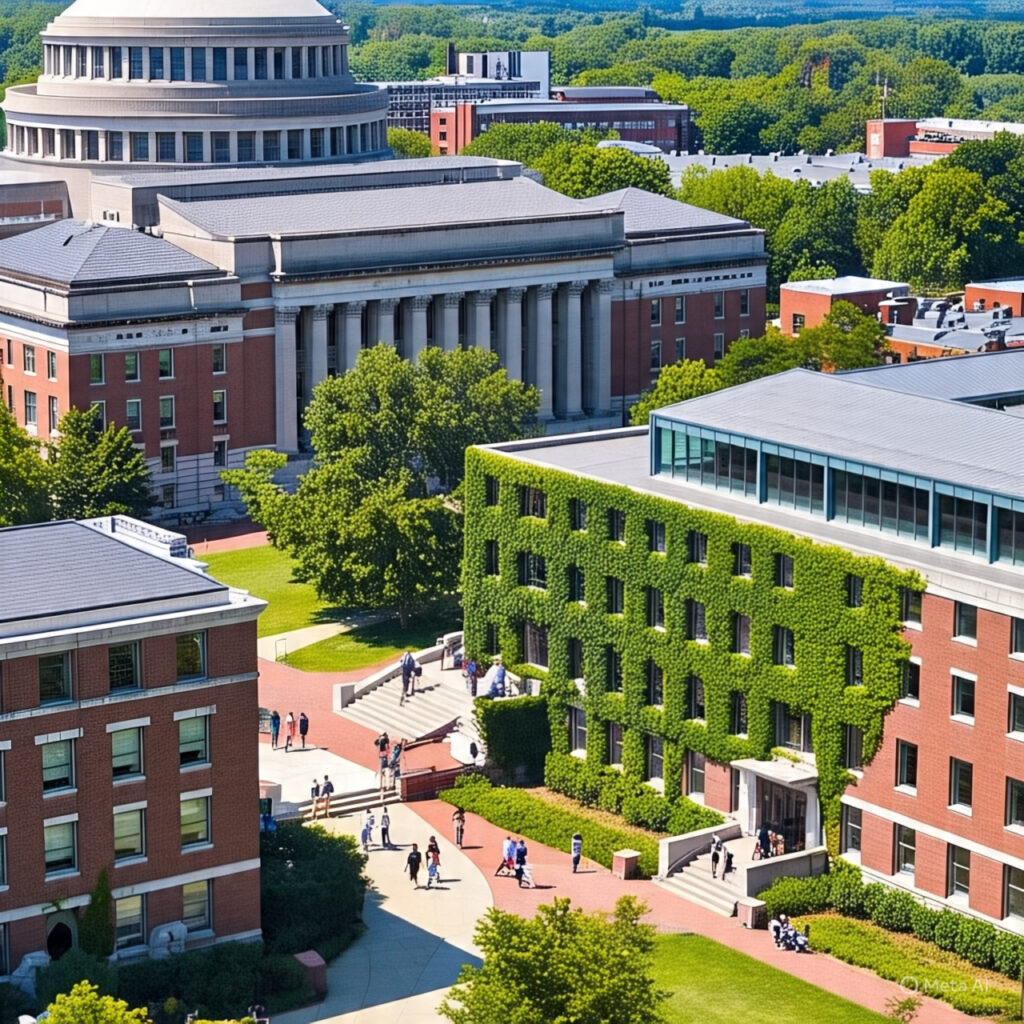Introduction
Think of the world’s boldest tech breakthroughs—chances are, MIT had a hand in them. The Massachusetts Institute of Technology (MIT) is more than just a top-tier university. It’s a launchpad for invention, leadership, and discovery. Located in Cambridge, Massachusetts, MIT empowers problem-solvers to change the world.
History and Legacy

Founding in 1861
MIT was founded in 1861, during the American Industrial Revolution, to promote hands-on scientific and technical education.
Mission and Vision
Its motto, “Mens et Manus” (Mind and Hand), reflects its practical, application-based learning approach—where theory meets real-world practice.
Evolution Over the Decades
From military innovation in WWII to breakthroughs in computing, biotech, and AI, MIT has continually shaped the modern world.
Campus and Location
Cambridge, Massachusetts
Nestled along the Charles River, MIT’s location is a tech and academic hotbed, just across from downtown Boston.
Architectural Highlights
Iconic buildings like the Great Dome, the Stata Center designed by Frank Gehry, and the modern MIT.nano center offer a blend of history and innovation.
State-of-the-Art Labs and Buildings
From cleanrooms to nuclear reactors, the MIT campus is packed with cutting-edge labs that fuel breakthrough discoveries.
Academic Structure
Schools and Departments
MIT consists of five schools:
- School of Engineering
- School of Science
- School of Architecture and Planning
- Sloan School of Management
- School of Humanities, Arts, and Social Sciences
Popular Programs
Top-ranked in fields like Computer Science, Mechanical Engineering, Physics, and Economics, MIT sets global standards.
Faculty and Mentorship
With Nobel Laureates, Fields Medalists, and MacArthur Fellows on faculty, students are mentored by the best.
Research Powerhouse
Global Research Contributions
MIT spends over $1 billion annually on research. From solving climate challenges to creating smarter algorithms, MIT leads the way.
AI, Robotics, and Beyond
Home to the legendary CSAIL (Computer Science and Artificial Intelligence Laboratory), MIT has pioneered advancements in AI, robotics, and machine learning.
Interdisciplinary Collaboration
MIT fosters collaboration across departments—where physicists work with artists and biologists with engineers to spark fresh ideas.
Admissions Process
Requirements and Criteria
Applicants need exceptional academic records, standardized test scores, essays, and passion for solving real problems.
Selection Rate
With an acceptance rate under 5%, MIT is incredibly selective—admitting those who are truly passionate, curious, and resilient.
Advice for Applicants
Show your intellectual hunger. MIT values those who don’t just get good grades but seek out and create solutions.
Financial Aid and Support
Scholarships and Grants
MIT has a need-blind admission policy for all students, including internationals. Aid is generous and 100% of demonstrated need is met.
Work-Study Opportunities
Students can also earn while they learn, with numerous part-time roles on campus.
Support for Global Students
MIT provides resources for international students, including visa assistance, housing help, and mentorship programs.
Student Life at MIT
Clubs and Extracurriculars
With over 500 student groups, there’s something for everyone—robotics, dance, music, cultural clubs, and more.
Housing and Dining
MIT offers unique living-learning communities, where dorms become creative hubs for student innovation.
MIT Culture and Traditions
From the legendary Hacks (elaborate student pranks) to the Brass Rat ring, MIT culture is quirky, proud, and brilliant.
Entrepreneurship and Innovation
MIT Media Lab and CSAIL
The MIT Media Lab explores cutting-edge tech like wearable computers and neurotechnology. CSAIL drives AI research worldwide.
Startups and Spin-offs
MIT alumni have launched 30,000+ companies, creating 4.6 million jobs and $2 trillion in revenue globally.
The MIT Innovation Ecosystem
Programs like Sandbox, The Engine, and MITx help students turn big ideas into global solutions.
MIT and the World
Collaborations and Impact
MIT works with NASA, WHO, Google, Microsoft, and governments to tackle real-world challenges.
Global Education Programs
Initiatives like MITx and OpenCourseWare offer free courses to millions worldwide.
Alumni Around the World
From Kofi Annan to Richard Feynman, MIT alumni have reshaped politics, science, education, and business.
Notable Alumni
Nobel Laureates
Over 90 MIT alumni and faculty have won the Nobel Prize.
Tech Giants and Founders
Alumni include founders of Intel, Dropbox, Bose, iRobot, and Qualcomm.
Leaders and Visionaries
Whether it’s astronauts, CEOs, economists, or authors, MIT’s alumni make waves in every sector.
Why MIT?
Problem-Solving Culture
MIT trains students to think fearlessly and act practically—solving real-world problems that matter.
Global Reputation
Ranked consistently as the #1 university in the world for tech and science, MIT has unmatched prestige.
Career Launchpad
With elite recruiters, startups, and labs at your doorstep, an MIT degree opens every door.
Conclusion
MIT is more than a university—it’s a mindset. A bold, brilliant, and relentless community of dreamers, builders, and changemakers. Whether you’re designing the next Mars rover or programming the next AI revolution, MIT gives you the tools, freedom, and vision to lead the way.
FAQs
1. What makes MIT different from other tech schools?
MIT’s hands-on, interdisciplinary approach and research intensity set it apart globally.
2. Can international students apply?
Yes, and MIT is fully need-blind for international applicants.
3. What’s the hardest program to get into at MIT?
Computer Science and Engineering are extremely competitive, attracting the world’s best.
4. Is MIT only about engineering?
No! MIT excels in economics, biology, architecture, and even philosophy.
5. What’s the student culture like?
Collaborative, innovative, and proudly nerdy—with a strong sense of humor and creativity.